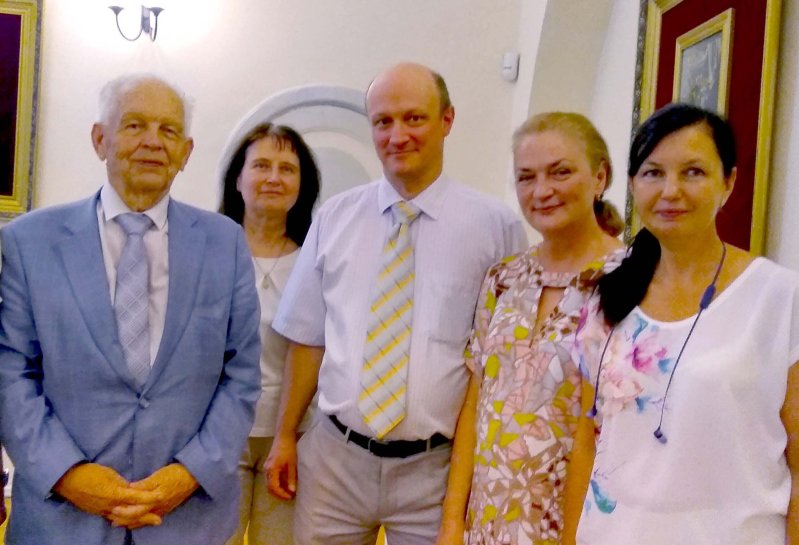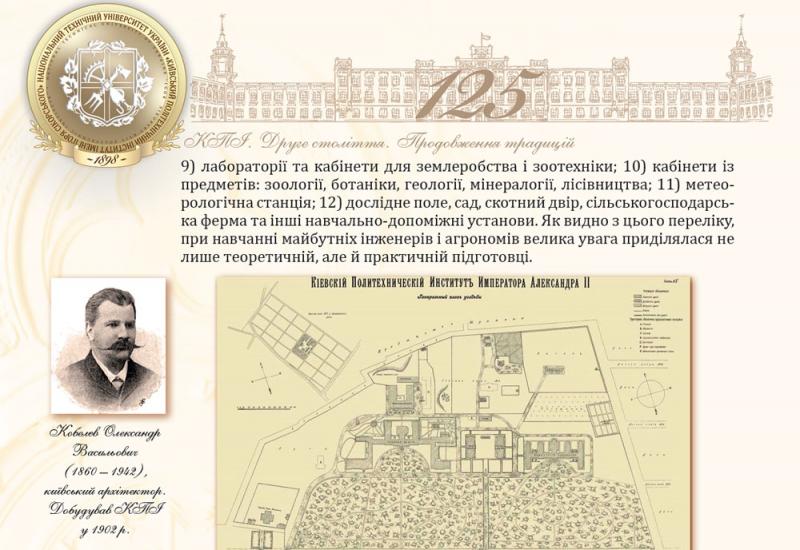Our newspaper has already written about the book "KPI. The second century. Continuation of traditions", which was published to the 125th anniversary of the National Technical University of Ukraine "Igor Sikorsky Kyiv Polytechnic Institute". In terms of design and concept, it is a continuation of the publication created for the university's centenary: an extensive essay on the foundation and development of the university, covering the entire period of its existence - from the idea of its creation to the beginning of the new millennium, materials on the current state of the university and the changes that have taken place over the past 25 years, a detailed account of its educational and research activities, and, of course, all educational and research institutes, faculties and other units. At the same time, the story of the history and present of Igor Sikorsky Kyiv Polytechnic Institute is presented through a rethinking of the past and in their relationship with the present.
The book was published by the university publishing house "Polytechnic" and, given its format, a huge amount of illustrative material and some unusual innovations for our printing industry (first of all, the placement of QR codes on its pages, which refer the curious reader to the primary sources), preparing it for printing was a very difficult task. It is not for nothing that the deputy editor-in-chief of the publication, chairman of the Academic Council of KPI, academician of the National Academy of Sciences of Ukraine Mykhailo Ilchenko later noted that the book became "a business card of our university, a clear demonstration of what the team of the Polytechnic Publishing House can do - it is its best advertisement."
Behind the large amount of new information contained in the book is the significant work of the authors and university staff who helped to prepare the publication. There were a lot of them: as Mykhailo Ilchenko said when presenting the signal copy of the book at a meeting of the university administration, a large number of employees of our university provided the content of its content, and more than 80 people working in its various departments helped to implement this project. By the way, the words of gratitude to the authors and each of the assistants in the preparation of this elegant volume with their names are placed on its final pages.

All the work took place in very difficult and unusual circumstances, because most of it took place at the time of the beginning of the full-scale war that Russia unleashed against our country. Thus, the authors, compilers, editors, and printers worked in conditions of periodic power outages and to the accompaniment of regular air raid alarms, and sometimes to the sound of not-so-distant explosions.
This was said by those who made the most effort to make this publication come out, who gathered to congratulate Mykhailo Ilchenko on his birthday.
"I have always wanted to make, or rather help to make, a book "for many years" that would be useful for future generations. Mykhailo Yukhymovych is an incredible person who is easy to work with, easy to solve problems, and easy to get in touch with. When it is easy, everything moves in the right direction. "Thanks to this, we managed to publish the book," recalls Svitlana Zigula, director of the Politekhnika Publishing House, "Some kind of magic happened, and we did it against all odds-all those arrivals, all those power outages. We had to meet every Friday to discuss our business and set tasks for the next week. And now, to be honest, I miss those Fridays, they feel empty. They were filled with important content."
"It was really a creative work: something in the structure and text of the book was changed, added, and some things had to be rewritten," Vitaliy Tatarchuk shared his impressions of the work. "Indeed, we were constantly bothered by power outages, but thanks to a powerful charging station in Mykhailo Yukhymovych's office, we continued to do our job. To be honest, I became confident that we would overcome it in January, when we completed the first major part of the book. I thought that personally my mission was over, but no, we went further. And then, in the course of the work, I had to clarify and supplement the content of the chapters, check many points, and so on. I had never worked at such a pace before, and it was an invaluable experience. And one more thing: with so many authors, it was necessary to organize the work properly, which Mykhailo Yukhymovych did, and how many coordination calls, phone calls, reminders, even demands for careful preparation and timely submission of materials! And I have always said that the history of KPI is very multifaceted, multicolored, multidimensional. Of course, we have done a great job, but there is still a lot we could not say because we were limited by time and a certain amount of space. So I hope we will not stop there."
And yet we will not stop - "creative Fridays" in Mykhailo Ilchenko's office have recently resumed: due to the fact that the first edition of the book "KPI. The second century. Continuation of traditions" was quite limited, and the number of people willing to buy it is growing, it was decided to prepare the second, supplemented edition. So the work continues...

